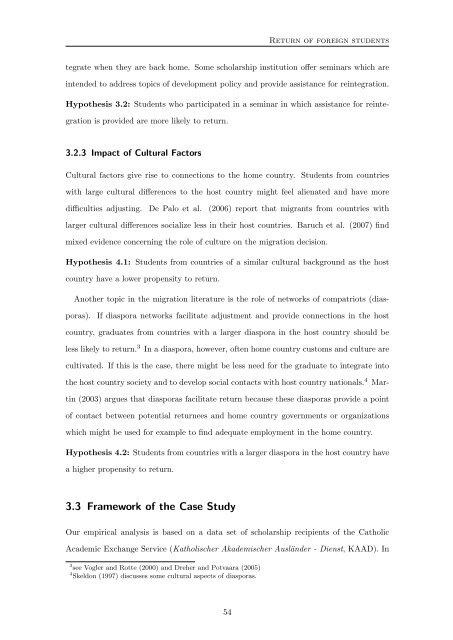Four Essays on University Economics - KOPS - Universität Konstanz
Four Essays on University Economics - KOPS - Universität Konstanz
Four Essays on University Economics - KOPS - Universität Konstanz
Create successful ePaper yourself
Turn your PDF publications into a flip-book with our unique Google optimized e-Paper software.
Return of foreign students<br />
tegrate when they are back home. Some scholarship instituti<strong>on</strong> offer seminars which are<br />
intended to address topics of development policy and provide assistance for reintegrati<strong>on</strong>.<br />
Hypothesis 3.2: Students who participated in a seminar in which assistance for reinte-<br />
grati<strong>on</strong> is provided are more likely to return.<br />
3.2.3 Impact of Cultural Factors<br />
Cultural factors give rise to c<strong>on</strong>necti<strong>on</strong>s to the home country. Students from countries<br />
with large cultural differences to the host country might feel alienated and have more<br />
difficulties adjusting. De Palo et al. (2006) report that migrants from countries with<br />
larger cultural differences socialize less in their host countries. Baruch et al. (2007) find<br />
mixed evidence c<strong>on</strong>cerning the role of culture <strong>on</strong> the migrati<strong>on</strong> decisi<strong>on</strong>.<br />
Hypothesis 4.1: Students from countries of a similar cultural background as the host<br />
country have a lower propensity to return.<br />
Another topic in the migrati<strong>on</strong> literature is the role of networks of compatriots (dias-<br />
poras). If diaspora networks facilitate adjustment and provide c<strong>on</strong>necti<strong>on</strong>s in the host<br />
country, graduates from countries with a larger diaspora in the host country should be<br />
less likely to return. 3 In a diaspora, however, often home country customs and culture are<br />
cultivated. If this is the case, there might be less need for the graduate to integrate into<br />
the host country society and to develop social c<strong>on</strong>tacts with host country nati<strong>on</strong>als. 4 Mar-<br />
tin (2003) argues that diasporas facilitate return because these diasporas provide a point<br />
of c<strong>on</strong>tact between potential returnees and home country governments or organizati<strong>on</strong>s<br />
which might be used for example to find adequate employment in the home country.<br />
Hypothesis 4.2: Students from countries with a larger diaspora in the host country have<br />
a higher propensity to return.<br />
3.3 Framework of the Case Study<br />
Our empirical analysis is based <strong>on</strong> a data set of scholarship recipients of the Catholic<br />
Academic Exchange Service (Katholischer Akademischer Ausländer - Dienst, KAAD). In<br />
3 see Vogler and Rotte (2000) and Dreher and Potvaara (2005)<br />
4 Skeld<strong>on</strong> (1997) discusses some cultural aspects of diasporas.<br />
54

















